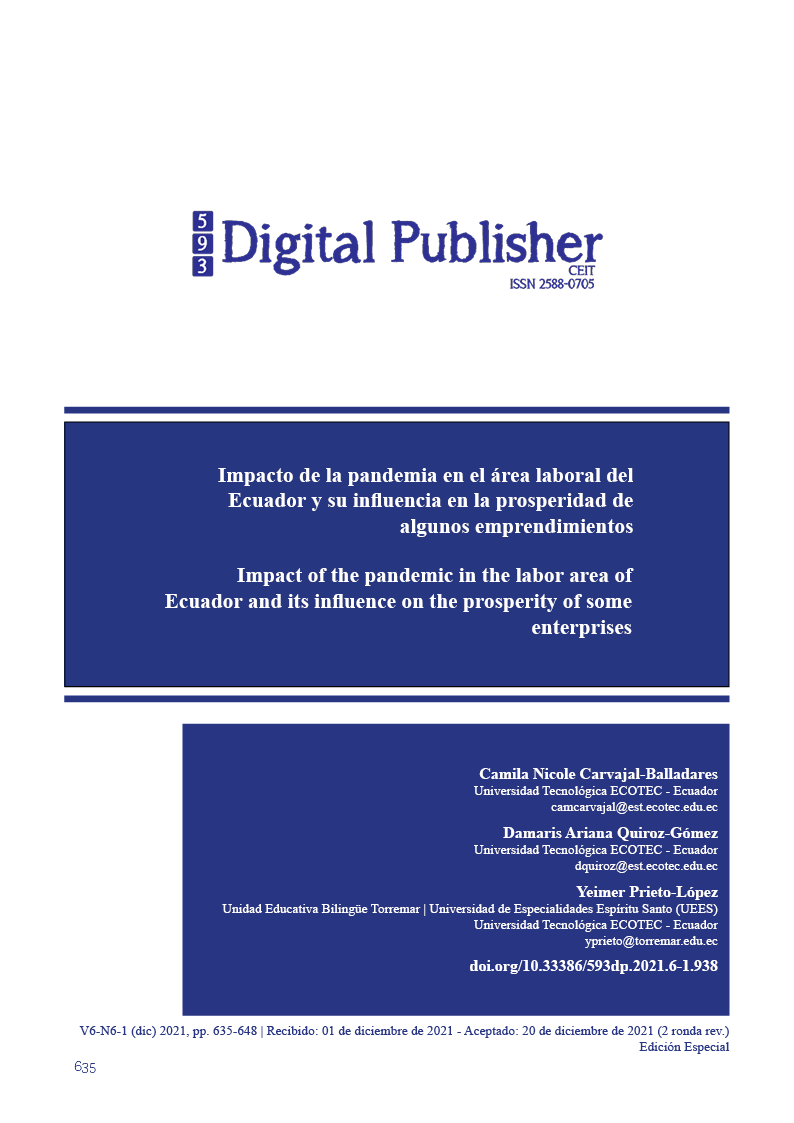Impact of the pandemic in the labor area of Ecuador and its influence on the prosperity of some enterprises
Main Article Content
Abstract
This research aims to analyze the main incidents of the pandemic in the labor area of Ecuador and describe alternatives for the economic reactivation of the most affected enterprises. Different scientific methods were used such as: historical-logical that allowed to obtain the main theoretical and methodological foundations that support the variables of the research, the theoretical systematization, scientific observation, surveys; as well as the criteria of experts and specialists. The research was oriented under the quantitative, descriptive, transactional field paradigm.
The objective of this work is to examine some theoretical contributions on entrepreneurship, in order to deepen this concept, rescue the characteristics that an entrepreneur has, and examine the importance of the entrepreneurial spirit in the social order in times of the Covid-2019 pandemic. Specifically, it is analyzed whether education can encourage individuals to have entrepreneurial attitudes and the role that the State is responsible for in this regard; also if the existence of enterprises reduces unemployment; and the relationship of the concept of entrepreneurship with that of local development in our current times. To meet the aforementioned objectives, a theoretical study of these issues was carried out, based on a theoretical review of the contributions to date. The bibliography was searched, selected and systematized, to analyze it and finally present the conclusions.
It is intended to understand the relationship between entrepreneurship and other concepts such as education, employment and development in the labor area of Ecuador. An attempt is made to study whether education can encourage individuals to acquire entrepreneurial attitudes and the role that the State has in this regard; if the existence of enterprises can reduce unemployment; and if there is an entrepreneurial spirit in a community, positive effects are generated for its development.
Downloads
Article Details

This work is licensed under a Creative Commons Attribution-NonCommercial-ShareAlike 4.0 International License.
1. Derechos de autor
Las obras que se publican en 593 Digital Publisher CEIT están sujetas a los siguientes términos:
1.1. 593 Digital Publisher CEIT, conserva los derechos patrimoniales (copyright) de las obras publicadas, favorece y permite la reutilización de las mismas bajo la licencia Licencia Creative Commons 4.0 de Reconocimiento-NoComercial-CompartirIgual 4.0, por lo cual se pueden copiar, usar, difundir, transmitir y exponer públicamente, siempre que:
1.1.a. Se cite la autoría y fuente original de su publicación (revista, editorial, URL).
1.1.b. No se usen para fines comerciales u onerosos.
1.1.c. Se mencione la existencia y especificaciones de esta licencia de uso.
References
Alvino, Clay (mayo 5, 2021) “Estadísticas de la situación digital de Ecuador en el 2020-2021”. https://branch.com.co/marketing-digital/estadisticas-de-la-situacion-digital-de-ecuador-en-el-2020-2021/
Ana Esteves (2020), compiladora y Editora de Facultad Latinoamericana de Ciencias Sociales, Ecuador – FLACSO “El impacto del COVID-19 en el mercado de trabajo de Ecuador” (Volumen 7 • No. 2 • noviembre 2020 35-41).
Crals, E. & Vereeck, L. (2005). The affordability of sustainable entrepreneurship certification for SMEs. International Journal of Sustainable Development & World Ecology, 12(2), 173-183. doi:10.1080/13504500509469628
Chirinos, Y. (2014). Emprendimiento sostenible como política pública. En Petit., E. (Ed.) Tendencias y perspectivas de políticas públicas en ciencia, tecnología e innovación. (305 – 324). Maracaibo. Venezuela. Sello editorial Ediluz.
Chirinos, Y. & Pérez, C. (2016). La Responsabilidad Social Universitaria: emprendimiento sostenible como impacto de intervención en comunidades vulnerables. Revista EAN, (81), 91- 110.
Chrinos, Y., Martínez, C. & Meriño, V. (2017) El emprendimiento sostenible como generador de conocimiento en las PYMES. En Meriño, V., Chirinos Y., Camejo. L., & Martinez, C. (Ed.) Gestión del Conocimiento Perspectiva Multidisiplinaria. (36 – 58). Coro. Venezuela: Sello Editorial Alonso Gamero.
Dean, T. & McMullen, J. (2007). Toward a theory of sustainable entrepreneurship: Reducing environmental degradation through entrepreneurial action. Journal of Business Venturing, 22(1), 50-76. doi: 10.1016/j.jbusvent.2005.09.003
Hernández, R; Fernández, C. & Baptista L. (2003). Metodología de la Investigación. 3era ed. México: McGraw Hill Interamericana.
Jürgen Weller (2020) “La pandemia del COVID-19 y su efecto en las tendencias de los mercados laborales”.
Jorge Oswaldo Quevedo-Vázquez (2020), Leydy Tatiana Pinzón-Prado, Lourdes Maribel Vásquez-Lafebre, Manuel Rafael Quevedo-Barros.
Kantis, H. (2008). Aportes para el diseño de Programas Nacionales de Desarrollo Emprendedor en América Latina. Banco Interamericano de Desarrollo. Vicepresidencia de sectores y conocimiento sector social división de ciencia y tecnología. Notas Técnicas IDB-TN-132. Recuperado de: http://services.iadb.org/wmsfiles/products/Publications/35166775.pdf
Lederman, D. Messina, J. Pienknagura, S. & Rigolini, J. (2014). El emprendimiento en América Latina: muchas empresas y poca innovación. Washington, DC: Banco Mundial. doi:10.1596/978-1-4648-0284-3. Martínez, L. (2013). Diagnóstico de veinte microempresas sostenibles atendidas por el CENAP (tesis doctoral). Universidad Nacional de Costa Rica.
El Universo, diario digital (2019) “Bares y discotecas en Ecuador, golpeadas por la pandemia, ahora funcionan como restobares; algunos logran ingresos solo para el arriendo”. https://www.eluniverso.com/noticias/economia/bares-y-discotecas-en-ecuador-golpeadas-por-la-pandemia-ahora-funcionan-como-restobares-algunos-logran-ingresos-solo-para-el-arriendo-nota/.
Moreira Menéndez, M., Bajaña Mendieta, I. D., Pico Saltos, B. R., Guerrero Ulloa, and. G., & Villlarroel Bastidas, J. V. (2018). Factors that Influence Entrepreneurship and its Impact on the Economic Development of Ecuador. Journal of Social and Economic Sciences - UTEQ (2018)
Pitre, R. Rodríguez, J., Hernández, H. & Cardona, D. (2017). Emprendimiento competitivo y productivo como renovador del sector salud en la región Caribe. Revista Espacios, 38(42), 7- 16
Revista Científica Vol. 6, núm. 3 (2020)- Artículo de investigación “Impacto del COVID -19 en el emprendimiento del sector turístico en el Ecuador”.
Revista FIPCAEC (Edición 22) Vol. 5, No 4 (2020)- El emprendimiento como estrategia o necesidad en el desarrollo productivo de Ecuador. OMS (octubre 12, 2019) “Información básica sobre la COVID-19”.
Rojas, D., Chirinos, Y. & Garces G. (2017). El nuevo reto de la gerencia del talento humano los empleados tóxicos. En Meriño, V., Chirinos Y., Camejo. L. & Martinez, C. (Ed.) Gestión del Conocimiento Perspectiva Multidisiplinaria. (73 – 103). Coro. Venezuela: Sello Editorial Alonso Gamero.
STEVENSON H. H. 2000. Why the entrepreneurship has won! Disponible en www.usasbe.org/pdf/cwp-2000-stevenson.pdf
Thurik, R., Wennekers, S., & Uhlaner, L. (2002). Entrepreneurship and economic performance: a macro perspective. International Journal of Entrepreneurship Education, 1(2), 157-179




